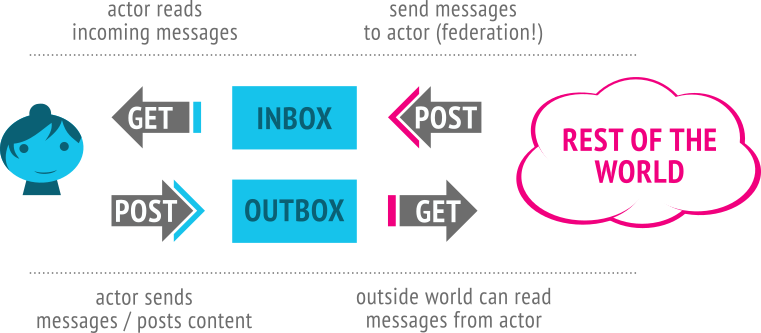|
OpenMicroBlogging
OpenMicroBlogging is a deprecated protocol that allows different microblogging services to inter-operate. It lets the user of one service subscribe to notices by a user of another service. This enables a federation of new communities,Stay, Jesse (2008-8-12Identi.ca and the Power of Microbranded Communities Retrieved 2009-1-4. as potentially an organization of any size can host a service. OpenMicroBlogging utilizes the OAuth and Yadis protocols and does not depend on any central authority. OpenMicroBlogging has been superseded by an enhanced version of it, OStatus. History The first implementation of the OpenMicroBlogging protocol is the Laconica software, which changed name to StatusNet in August 2009. Identi.ca is the first service to support OpenMicroBlogging,Mayfield, Ross (2008-7-2Identica launches, an open source Twitter Retrieved 2009-1-5. and other sizeable services including Leo Laporte's Twit Army ahttps://web.archive.org/web/20080826063959/http://army.twit.tv/were a ... [...More Info...] [...Related Items...] OR: [Wikipedia] [Google] [Baidu] |
Comparison Of Microblogging Services ...
: The tables below compare general and technical information for some notable active microblogging services, and also social network services that have ''status updates''. General information Features An overview of integral features. Extras may be provided by third party applications/services, but are not listed here. Posting and reading Communication methods supported by the services. Extras may be provided by third party applications/services, but are not listed here. See also * Microblogging * OpenMicroBlogging * Microblogging in China References {{Microblogging Microblogging services Microblogging Microblogging is a form of social network that permits only short posts. They "allow users to exchange small elements of content such as short sentences, individual images, or video links",. Retrieved June 5, 2014 which may be the major reason for ... [...More Info...] [...Related Items...] OR: [Wikipedia] [Google] [Baidu] |
OStatus
OStatus is an open standard for federated microblogging, allowing users on one website to send and receive status updates with users on another website. The standard describes how a suite of open protocols, including Atom, Activity Streams, WebSub, Salmon, and WebFinger, can be used together, which enables different microblogging server implementations to route status updates between their users back-and-forth, in near real-time. History OStatus federation was first possible between StatusNet installations, such as Status.net and Identi.ca, although Identi.ca later switched to pump.io. As of June 2013, a number of other microblogging applications and content management systems had announced that they intended to implement the standard. That same month, it was announced StatusNet would be merged into the GNU social project, along with Free Social. 6 Following the first official release of GNU Social, a number of microblogging sites running StatusNet and Free Social began to t ... [...More Info...] [...Related Items...] OR: [Wikipedia] [Google] [Baidu] |
Deprecated
In several fields, especially computing, deprecation is the discouragement of use of some terminology, feature, design, or practice, typically because it has been superseded or is no longer considered efficient or safe, without completely removing it or prohibiting its use. Typically, deprecated materials are not completely removed to ensure legacy compatibility or back up practice in case new methods are not functional in an odd scenario. It can also imply that a feature, design, or practice will be removed or discontinued entirely in the future. Etymology In general English usage, the infinitive "to deprecate" means "to express disapproval of (something)". It derives from the Latin verb ''deprecari'', meaning "to ward off (a disaster) by prayer". In current technical usage, for one to state that a feature is deprecated is merely a recommendation against using it. It is still possible to produce a program or product without heeding the deprecation. Software While a deprecated so ... [...More Info...] [...Related Items...] OR: [Wikipedia] [Google] [Baidu] |
Microblogging
Microblogging is a form of social network that permits only short posts. They "allow users to exchange small elements of content such as short sentences, individual images, or video links",. Retrieved June 5, 2014 which may be the major reason for their popularity. These small messages are sometimes called ''micro posts''. As with traditional blogging, users post about topics ranging from the simple, such as "what I'm doing right now," to the thematic, such as "sports cars." Commercial microblogs also exist to promote websites, services, and products and to promote collaboration within an organization. Some microblogging services offer privacy settings, which allow users to control who can read their microblogs or alternative ways of publishing entries besides the web-based interface. These may include text messaging, instant messaging, e-mail, digital audio, or digital video. Origin The first micro-blogs were known as ''tumblelogs''. The term was coined by why the lucky stiff ... [...More Info...] [...Related Items...] OR: [Wikipedia] [Google] [Baidu] |
Interoperability
Interoperability is a characteristic of a product or system to work with other products or systems. While the term was initially defined for information technology or systems engineering services to allow for information exchange, a broader definition takes into account social, political, and organizational factors that impact system-to-system performance. Types of interoperability include syntactic interoperability, where two systems can communicate with each other, and cross-domain interoperability, where multiple organizations work together and exchange information. Types If two or more systems use common data formats and communication protocols and are capable of communicating with each other, they exhibit ''syntactic interoperability''. XML and SQL are examples of common data formats and protocols. Lower-level data formats also contribute to syntactic interoperability, ensuring that alphabetical characters are stored in the same ASCII or a Unicode format in all the commun ... [...More Info...] [...Related Items...] OR: [Wikipedia] [Google] [Baidu] |
OAuth
OAuth (short for "Open Authorization") is an open standard for access delegation, commonly used as a way for internet users to grant websites or applications access to their information on other websites but without giving them the passwords. This mechanism is used by companies such as Amazon, Google, Facebook, Microsoft, and Twitter to permit the users to share information about their accounts with third-party applications or websites. Generally, OAuth provides clients a "secure delegated access" to server resources on behalf of a resource owner. It specifies a process for resource owners to authorize third-party access to their server resources without providing credentials. Designed specifically to work with Hypertext Transfer Protocol (HTTP), OAuth essentially allows access tokens to be issued to third-party clients by an authorization server, with the approval of the resource owner. The third party then uses the access token to access the protected resources hosted by the r ... [...More Info...] [...Related Items...] OR: [Wikipedia] [Google] [Baidu] |
Yadis
{{Unreferenced , date= November 2013 Yadis is a communications protocol for discovery of services such as OpenID, OAuth, and XDI connected to a Yadis ID. While intended to discover digital identity services, Yadis is not restricted to those. Other services can easily be included. A Yadis ID can either be a traditional URL or a newer XRI i-name, where the i-name must resolve to a URL. The so-called Yadis URL either equals the Yadis ID (if this is a URL) or the resolved URL of the XRI i-name. Furthermore, Yadis specifies how to use the Yadis URL to retrieve a service descriptor called ''Yadis Resource Descriptor''. This descriptor follows the XRDS format and connects several services, like authentication or authorization to the Yadis URL. Each service description can have further parameters. Modular architecture Yadis follows the REST-ful, "small pieces loosely joined" paradigm that has proven to be successful in the development of the web. The basic assumption is that iden ... [...More Info...] [...Related Items...] OR: [Wikipedia] [Google] [Baidu] |
Leo Laporte
Leo Laporte (; born November 29, 1956) is the host of ''The Tech Guy'' weekly radio show and a host on TWiT.tv, an Internet podcast network focusing on technology. He is also a former TechTV technology host (1998–2008) and a technology author. On November 19, 2022, actor, writer, musician, and comedian Steve Martin called in to Laporte's radio show to announce Leo's retirement from ''The Tech Guy'' radio show. Laporte's last new radio show will be December 18, 2022 with reruns for the remainder of the year. Rich DeMuro later appeared on the show to announce that he will be taking over in January with a weekly show, recorded on Saturdays, called "Rich On Tech." Background Laporte was born in New York City, the son of geologist Leo F. Laporte. He studied Chinese history at Yale University before dropping out in his junior year to pursue a career in radio broadcasting, where his early on-air names were Dave Allen and Dan Hayes. He began his association with computers with his fi ... [...More Info...] [...Related Items...] OR: [Wikipedia] [Google] [Baidu] |
Opensource
Open source is source code that is made freely available for possible modification and redistribution. Products include permission to use the source code, design documents, or content of the product. The open-source model is a decentralized software development model that encourages open collaboration. A main principle of open-source software development is peer production, with products such as source code, blueprints, and documentation freely available to the public. The open-source movement in software began as a response to the limitations of proprietary code. The model is used for projects such as in open-source appropriate technology, and open-source drug discovery. Open source promotes universal access via an open-source or free license to a product's design or blueprint, and universal redistribution of that design or blueprint. Before the phrase ''open source'' became widely adopted, developers and producers have used a variety of other terms. ''Open source'' gaine ... [...More Info...] [...Related Items...] OR: [Wikipedia] [Google] [Baidu] |
ActivityPub
ActivityPub is an open, decentralized social networking protocol based on Pump.io's ActivityPump protocol. It provides a client/server API for creating, updating, and deleting content, as well as a federated server-to-server API for delivering notifications and content. Project status ActivityPub is a standard for the Internet in the Social Web Networking Group of the World Wide Web Consortium (W3C). The standard was co-authored by Evan Prodromou, creator of StatusNet (now known as GNU social). At an earlier stage, the name of the protocol was "ActivityPump", but it was felt that ActivityPub better indicated the cross-publishing purpose of the protocol. It learned from the experiences with the older standard called OStatus. It is the most widely supported standard (by some margin) in the Fediverse. In January 2018, the World Wide Web Consortium (W3C) published the ActivityPub standard as a Recommendation. The W3C Social Community Group organizes a yearly free conferen ... [...More Info...] [...Related Items...] OR: [Wikipedia] [Google] [Baidu] |

